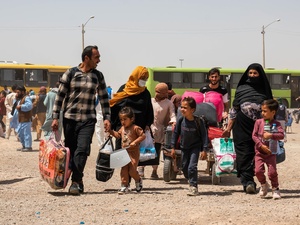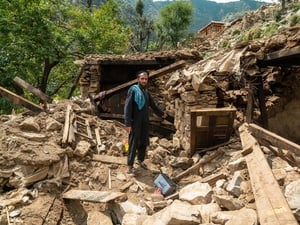Afghan-Tajik returns boost repatriation numbers to 300,000
Afghan-Tajik returns boost repatriation numbers to 300,000

The last 105 Afghans left the Pyandj River islands along the Afghan-Tajik border on Thursday.
ISLAMABAD, Pakistan, April 19 (UNHCR) - The return of Afghan refugees to Afghanistan today hit the 300,000 mark as UNHCR completed repatriating nearly 9,000 Afghans from the Pyandj River area on the border with Tajikistan.
On Thursday, the UN refugee agency completed the repatriation of 8,918 Afghans who have been stuck for a year and a half on islands and promontories of the Pyandj River, which marks the border between Afghanistan and Tajikistan. Protection officers from UNHCR said the last 105 people left the islands for the region of Kunduz in north-eastern Afghanistan in trucks supplied by the International Organization for Migration.
From Pakistan, more than 285,000 returns have been recorded since UNHCR and the Kabul and Islamabad governments launched a programme on March 1 to provide Afghan returnees with travel expenses, a UNHCR package of relief goods and 150 kilogrammes of wheat from the World Food Programme.
Another 10,000 Afghans have returned from Iran since a similar assistance programme began on April 9.
UNHCR has also helped 15,000 internally displaced Afghans return from the Soviet compound in Kabul to their homes in the Shomali Plain in central Afghanistan.
There are currently 3.5 million Afghan refugees in Iran and Pakistan. UNHCR hopes to help repatriate 800,000 of them this year, along with 400,000 internally displaced people.
At its current rate, the repatriation movement of the world's largest refugee group is shaping up to be the biggest and fastest since 800,000 refugees went home to Kosovo in 1999 at the end of the civil conflict in the Serbian province.
"It is certainly an emergency in reverse, but a positive and hopeful one," said Filippo Grandi, UNHCR's chief of mission in Afghanistan. "People are retracing their flight journey back to their homes. We are doing everything we can to help them."
Meanwhile, High Commissioner Ruud Lubbers travelled today to Islamabad, where he is scheduled to meet with top Pakistani officials. This marks the last leg of an eight-day, three-country tour of the region that had earlier taken him to Iran and Afghanistan.









